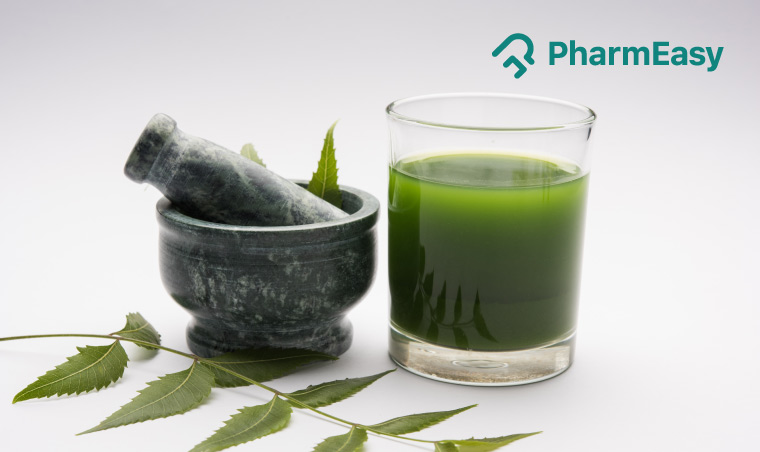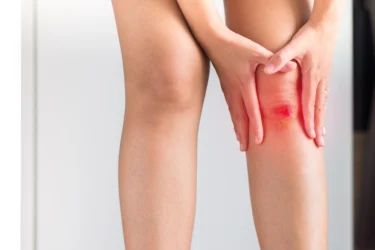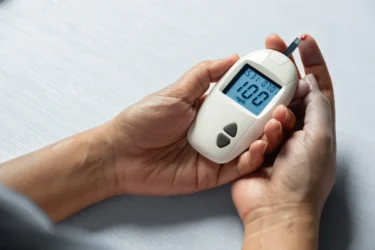Neem Juice: Uses, Benefits, Side effects and More!
By Dr Rajeev Singh +2 more

Get,

to manage your symptom
Get your,


4 Cr+ families
benefitted

OTP sent to 9988776655



You’ve successfully subscribed to receive
doctor-approved tips on
Whatsapp

Get ready to feel your best.

Hi There,
Download the PharmEasy App now!!


Register to Avail the Offer
Send OTPBy continuing, you agree with our Privacy Policy and Terms and Conditions

Hi There,
Sign up on PharmEasy now!!
Trusted by 4 crore+ families

OTP sent to 9988776655



You have unlocked 25% off on medicines




Code: NU25
By Dr Rajeev Singh +2 more
Table of Contents
If you are searching for a healthy drink to kick start your day, look no further! Packed with numerous health benefits, neem juice can be your choice for a healthier and better future.
As people become more mindful of their health concerns, more and more people have started relying on herbal juices. Neem juice is a bitter juice obtained from crushing the leaves of the neem tree. Neem, scientifically known as Azadirachta indica, belongs to the Meliaceae family. The neem plant is commonly found in India, Bangladesh, Nepal and Pakistan. Neem has been widely used in traditional systems of medicine such as Chinese medicine, Unani medicine and the Ayurvedic system of medicine1.

Effective properties of many plants are being researched for disease management because of their fewer side effects. Neem juice contains numerous phytochemicals that possess functional properties against diseases. The effective properties of neem leaves are very well documented1.
If you want to learn about bitter neem juice health effects, continue reading!
Some nutrients found in neem leaf are minerals like calcium and phosphorous2. Neem juice also contains plenty of phytochemicals such as
Owing to the hist of phytochemicals it contains, neem juice may show the following properties for human health.
Neem juice possesses many valuable properties because of which it has potential uses for many health conditions. However, most of these uses have been observed in lab-scale trials using neem leaf extract. Neem juice may show properties similar to leaf extract and may show effects against several disease conditions. However, more research is required to consolidate its uses in people. Therefore, you are advised to consult a physician before using neem juice on your own as a remedy for any serious medical condition.

Neem leaf extract could help promote wound healing as observed during several animal studies. This wound healing property was observed on rats. Using neem juice may show properties similar to extract. Therefore, you may use neem juice to help accelerate wound healing1. However, if you are suffering from any wound, you still need to take complete wound care to prevent the wound from getting infected. Avoid using neem juice without consulting with a doctor first.

Neem extract has been evaluated for its antidiabetic activity in lab studies. Neem extract may show positive effects on blood glucose and help reduce the activity of the glucosidase enzyme (responsible for breaking complex carbohydrates into glucose). Neem leaf extract also showed activity against diabetes mellitus1. These activities may help manage diabetes. However, if you have diabetes, avoid using neem juice or any other herbal remedy without consulting your healthcare provider first.

Neem leaf extract showed good potential as a liver protectant. The positive effects of neem leaf extract against liver toxicity and damage were observed during animal studies. Neem leaf extract could show positive effects during the trial by restoring the levels of liver enzymes1. These effects may point in a positive direction. However, you must reach out to your healthcare provider in case of any liver problems. Trying to treat liver problems with herbs and tonics without consulting a doctor may worsen the situation.
As neem has hepatoprotective, gastroprotective, and antispasmodic properties, neem juice might be beneficial for maintaining digestive health. Drinking neem juice might promote bowel movement, improve liver function and might relieve constipation6.
Dr. Rajeev Singh, BAMS

Neem leaf extract has shown antibacterial activity against several foodborne bacteria. The activity against bacterial growth has also been observed in other lab trials. Neem leaf extract has also shown activity against the growth of several fungal species during lab studies. In addition to activities against bacteria and fungi, the potential use of neem extract against the growth of coxsackievirus has been observed1. Neem juice may have these properties as well. All these activities were observed during lab studies. If you are suffering from any infection, bacterial, viral or fungal, you must get treated by a healthcare provider and receive proper treatment as larger studies are needed to confirm efficacy in humans.
Neem leaves are proven to have antifungal properties. Because of this, the juice extracted from its leaves might be beneficial for reducing dandruff from the scalp and maintaining healthy hair and a clean scalp5.
Dr. Siddharth Gupta, B.A.M.S, M.D (Ayu)

Neem leaves possess potent antioxidant and anti-inflammatory activities. Free radicals in the body often lead to chronic diseases in the long run. Neutralizing these free radicals may help avoid the onset of many health conditions. The antioxidant properties of neem leaf may help destroy or neutralize the free radicals generated in the body. In addition, the anti-inflammatory properties of the neem leaf may also help with inflammation and swelling in the body1.
Though some studies show the benefits of neem juice in various conditions, these are insufficient, and more research to establish the true extent of the benefits of neem juice on human health.
To make fresh neem juice, you can clean some fresh leaves with water. Grind the leave and add water to it to make neem juice. You may consume raw neem juice to partake its health effects3.
You must consult a qualified doctor before taking neem juice or any herbal supplements. Likewise, do not discontinue or replace an ongoing treatment of modern medicine with an ayurvedic/herbal preparation without consulting a qualified doctor.
Various studies are reporting the liver toxicity of neem. Therefore, people with liver problems need to be careful while taking neem juice or herbal juice4.
Using neem juice without consulting with a doctor or physician is not advised. Before taking neem juice, you need to consult a doctor about its potential limitations, side effects and safe dose.
Also Read: Tomato (Tamatar) Juice: Uses, Benefits, Side Effects By Dr. Smita Barode
Here are some precautions you need to take while using neem juice.

There is a lack of sufficient information to support the use of neem juice during pregnancy or breastfeeding. Therefore, it is better to be on the safer side and avoid taking neem without consulting first with your doctor or healthcare provider.

There is a lack of information supporting the use of neem juice. Therefore, it is better to be on the safe side and avoid its use unless prescribed by a certified doctor or healthcare provider.

People suffering from liver ailments should avoid neem juice, which can lead to liver injury and damage4.
Before taking neem juice or any herbal juice, you need to first consult with a doctor about its limitations and precautions. Avoid using neem juice unless consulted by a doctor or physician.
Also Read: Ginger Juice: Uses, Benefits, Side Effects By Dr. Siddharth Gupta
Because of the various properties of neem leaf, it may show herb-drug interaction.
People who are taking acetaminophen regularly should avoid drinking neem leaf juice. Regular use of acetaminophen with neem leaf extract lead to liver toxicity in rats during lab trials4.
Avoid using neem juice for its properties or against any disease without consulting your doctor. Also, if you are taking some medicine, always consult your doctor about any herbs or juices you need to avoid. It’ll help you prevent serious health consequences.
Also Read: Lauki Juice: Uses, Benefits, Side Effects and More!
Neem juice may show properties against diseases like diabetes, liver problems and microbial infections. Neem juice may also show wound healing and anti-inflammatory and antioxidant properties1. However, before using neem juice for these effects, you are advised to consult with your healthcare provider. Avoid using herbal supplements without consulting with your doctor.
Intake of neem juice may lead to liver toxicity. There are several reported cases of neem extract causing liver toxicity4. If you have a weak liver or any liver problems, you are advised not to use neem juice. Use this juice only after consulting with a doctor.
Neem juice may show anti-inflammatory and antioxidant properties. It may help with inflammation and swelling of acne on the skin. It may also help purify the blood1,3. However, you can contact your skin doctor if you are suffering from any skin condition. Avoid using any herbal supplement without a doctor’s consultation.
Several lab studies are reporting the positive effects of neem juice on diabetes1. However, these studies are few and more studies are required to support neem juice use by people with diabetes. You should not use herbal supplements for serious health conditions like diabetes without consulting your doctor.
Disclaimer: The information provided here is for educational/awareness purposes only and is not intended to be a substitute for medical treatment by a healthcare professional and should not be relied upon to diagnose or treat any medical condition. The reader should consult a registered medical practitioner to determine the appropriateness of the information and before consuming any medication. PharmEasy does not provide any guarantee or warranty (express or implied) regarding the accuracy, adequacy, completeness, legality, reliability or usefulness of the information; and disclaims any liability arising thereof.
Links and product recommendations in the information provided here are advertisements of third-party products available on the website. PharmEasy does not make any representation on the accuracy or suitability of such products/services. Advertisements do not influence the editorial decisions or content. The information in this blog is subject to change without notice. The authors and administrators reserve the right to modify, add, or remove content without notification. It is your responsibility to review this disclaimer regularly for any changes.
Comments

Leave your comment...
You may also like
Comments